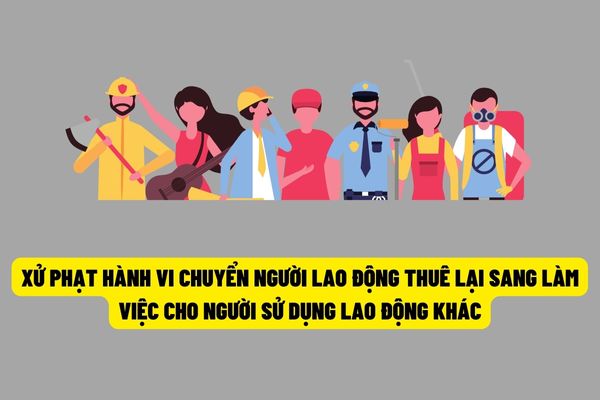If you let another employer sub-hire your outsourced labor in Vietnam, you will be subject to an administrative fine of up to VND 50,000,000?
Is it possible to transfer an outsourced employee to work for another employer?
Pursuant to Article 13 of Decree 12/2022/ND-CP stipulates as follows:
“Article 13. Violations against regulations on labor subleasing
1. A fine of between VND 3,000,000 and 5,000,000 shall be imposed on the outsourcer committing one of the following acts:
a) Failing to notify or instruct the outsourced employee to know one of the following contents: internal labor regulations; dangerous factors; harmful factors; measures to ensure occupational safety and health at the workplace and their other regulations;
…
2. A fine ranging from VND 40,000,000 to VND 50,000,000 shall be imposed on the outsourcer committing one of the following acts:
…
dd) Transfer of the subcontracted worker to another employer;
e) Employing the outsourced worker but having no specific agreement on the liability for compensation for occupational accidents and occupational diseases of the outsourced worker with the outsourcing enterprise;
g) Employing outsourced labor that does not fall into one of the following cases: to temporarily meet a sudden increase in demand for labor in a certain period of time; to replace employees during maternity leave, having a labor accident, occupational disease or having to perform civic obligations; there is a need to employ highly qualified and technical workers.
…
8. Additional sanctions
a) Deprive the right to use the labor outsourcing license for a term of between 06 and 12 months, for the violations specified at Point c, Clause 6 of this Article;
b) Confiscate material evidences and means of administrative violations that are forged labor subleasing operation permits, for violations specified at Point e, Clause 6, and Clause 7 of this Article.
9. Remedial measures
a) Forcing the outsourcing enterprise to pay the difference in salary to the employee when there is an act of paying the outsourced worker less than the salary of a worker with the same qualifications, doing the same job, or work of equal value of the outsourcer specified in Clause 4 of this Article;
b) Forcing to pay into the state budget illegal profits obtained from labor outsourcing activities, for violations specified in Clause 5 of this Article;
c) Forcible return of the license for outsourcing activities to the competent state agency that has granted such license when committing violations specified at Point dd, Clause 6 of this Article.”
Accordingly, the act of transferring outsourced workers to another employer will be subject to an administrative penalty of between VND 40 million and VND 50 million. Therefore, the employer will not be allowed to transfer the re-hired worker to work for another employer. Note, the above administrative sanction only applies to individuals, if the organization violates, the penalty will be doubled.
In addition, acts of violating regulations on labor subleasing will be administratively sanctioned according to the above provisions. In addition to being administratively sanctioned, the employer will have to implement additional sanctions and remedial measures according to the above provisions.

If you let another employer sub-hire your outsourced labor in Vietnam, you will be subject to an administrative fine of up to VND 50,000,000?
What rights and obligations will an employer who hires a worker have?
Pursuant to Article 57 of the Labor Code 2019 stipulates as follows:
“Article 57. Rights and obligations of the outsourcing party
1. Notify and guide the outsourced worker to know their labor rules and other regulations.
2. Not to discriminate in terms of working conditions for subcontracted employees compared with their own employees.
3. Agreement with the outsourced employee to work at night or work overtime in accordance with the provisions of this Code.
4. Agreement with the outsourced worker and the outsourcing enterprise to officially recruit the outsourced employee to work for him or her in the case of a labor contract between the outsourced employee and the outsourcing enterprise. labor has not ended.
5. Returning the outsourced worker who does not meet the agreed requirements or violates labor discipline to the outsourcing enterprise.
6. Provide the outsourcing enterprise with evidence of the employee's violation of labor discipline for consideration and handling of labor discipline."
Accordingly, the employer who hires the employee will be entitled to exercise the rights and obligations as prescribed above.
What are the principles of labor outsourcing?
Pursuant to Article 53 of the Labor Code 2019 stipulates as follows:
“Article 53. Principles of labor outsourcing activities
1. The maximum term of outsourcing for employees is 12 months.
2. The outsourcer may use the outsourced labor in the following cases:
a) Temporary response to a sudden increase in demand for labor in a certain period of time;
b) Replacing the employee during maternity leave, suffering a labor accident, occupational disease or having to perform civic obligations;
c) There is a need to employ workers with high professional and technical qualifications.
3. The outsourcer may not use the outsourced labor in the following cases:
a) To replace employees who are in the process of exercising the right to strike and settle labor disputes;
b) There is no specific agreement on the liability for compensation for occupational accidents and diseases of the outsourced worker with the outsourcing enterprise;
c) Replace employees who have been laid off due to changes in structure, technology, economic reasons or division, separation, consolidation or merger.
4. The outsourcing party may not transfer the outsourced employee to another employer; may not use subcontractors provided by enterprises that do not have a Labor Outsourcing License.”
Thus, the labor subleasing operation must comply with the above provisions.
LawNet
